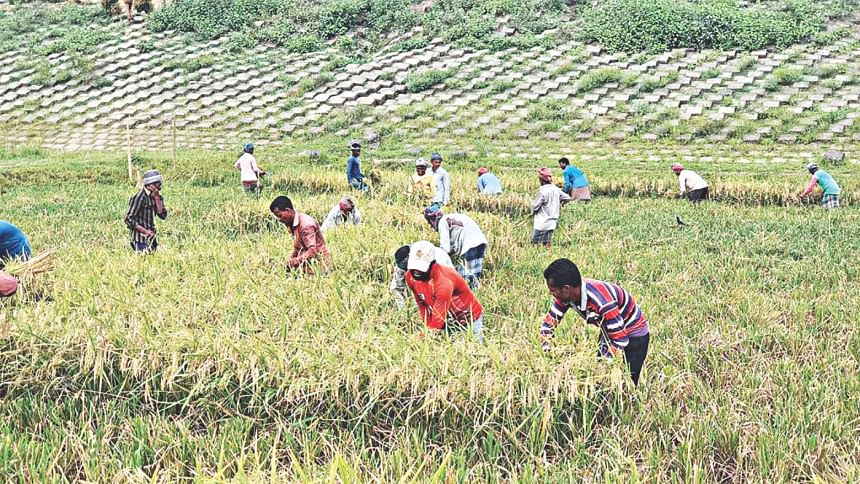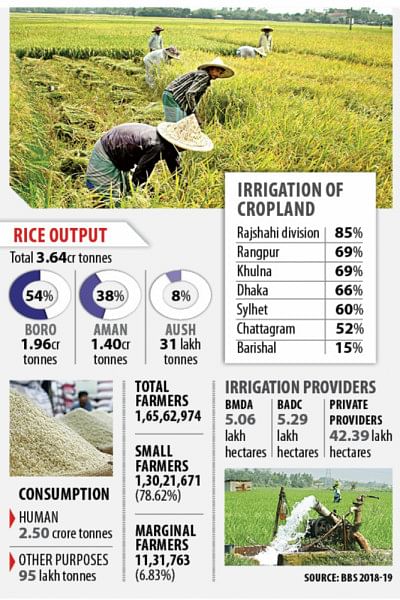Save Boro first, then Aush


The government incentives announced so far to deal with agricultural fallout of Covid-19 provide little relief for farmers awaiting harvest of Boro, the principal crop of the country.
The Tk 5,000-crore package declared recently leaves out crop and cereal producers. Even, the agriculture ministry's offer of free seeds, fertilisers and reduced irrigation charges will mainly aid the cultivation of Aush paddy, starting next month.
Boro accounts for more than 50 percent of the country's total rice production while Aush less than 10 percent, according to Bangladesh Bureau of Statistics (BBS) data.
Yet, the ministry is backing their decision to aid the cultivation of Aush instead of Boro, saying it is too late to cover Boro cultivation cost.
"Boro cultivation is almost over. The growers are now awaiting the harvest," Md Nasiruzzaman, secretary of the Agriculture ministry, told The Daily Star earlier this month.
"We are unable to provide any support to them [Boro farmers] right now. Implementing agricultural supports requires time, which has run out for Boro," he said.
However, farmers and agriculture experts do not agree with this.
Except for the haor region in Sylhet division, where Boro harvest has already begun, the Boro paddy fields in other parts of the country are still in need of irrigation before the crop is harvested next month, according to officials of Department of Agricultural Extension (DAE) and Bangladesh Rice Research Institute (BRRI).
A government cushion from beginning of this month would have saved small and marginal farmers from going broke with debt due to exorbitant irrigation costs, said the officials.
Boro cultivation starts in November-December. Up to one week before harvest, the fields require irrigation, farmers and agriculturists said.
In 2018-19, of 3.64 crore tonnes of rice produced in the country, Boro was 54 percent, Aman 38 percent and Aush only eight percent, from BBS data.
This year, the DAE is expecting two crore tonnes of Boro from 47.54 lakh hectares of land and 34 lakh tonnes of Aush from around 14 lakh hectares.
THE INCENTIVES
On April 12, Prime Minister Sheikh Hasina unveiled a stimulus package of Tk 5,000 crore to support agricultural sectors such as horticulture, fisheries, poultry, dairy and livestock.
Entrepreneurs who directly buy crops and cereals from farmers to sell in the market are also among the beneficiaries of the package, to be disbursed by banks through loans within September 30 at a maximum interest rate of four percent.
However, the package leaves out all crop and cereal farmers including those cultivating Boro.
A Bangladesh Bank circular detailing the package states that banks can lend a maximum of Tk 14,500 crore in the current fiscal year to crop and cereal farmers under an existing scheme, whose interest rate is nine percent.
The agriculture ministry also left out farmers from their recent stimulus package declared on April 8 allocating Tk 9.29 crore for distributing free seeds and fertilisers for Aush cultivation, scheduled to begin early next month.
In a few days, the government is likely to send directives about reduction of irrigation charges that are controlled by two major water providing institutions under the ministry -- Barind Multipurpose Development Authority (BMDA) and Bangladesh Agricultural Development Corporation (BADC), said Md Nasiruzzaman, secretary of the agriculture ministry.
"We mainly want to provide the facility to Aush crop and encourage the farmers for an increased cultivation and thus confirm a surplus production of rice," the secretary said.
Agriculture experts say increasing Aush production has become important for Bangladesh to avoid a food crisis as coronavirus might impact import of crops from other countries, but Boro should have been included in the support too.
A top agriculture official, wishing anonymity, said immediate support could have helped many Boro farmers. He said Boro cultivation used to account for around 60 percent of total rice output in previous years, but was reduced last year for lack of support.
Since Boro farmers had low paddy prices last year, several agricultural institutions including BRRI, DAE, BADC and BMDA, sent proposals to the ministry for waiving irrigation charges in full, he said.
But the farmers did not get the waiver this season.
Meanwhile, the government's allocation of Tk 200 crore to help farmers buy agricultural machinery, including combine-harvester and reaper with subsidy, is not helping farmers either, said Naogaon's farmer Rezaul Hasan.
"The combine harvesters do not work well in small plots of land. It also damages the hay, which many farmers sell to recover loss from sale of paddy. Only the threshing machine truly benefits the farmers," he said.
FARMER'S PLIGHT
Rezaul, who is cultivating Boro on 30 acres of land Niamatpur upazila, spends around Tk 1,400 to Tk 3,500 per 0.4 acres to irrigate his cropland.
Although he qualifies for an agriculture loan from banks, he goes without one. He claimed borrowers often have to bribe middlemen to obtain the loan.
Khoka Pramanik cultivating 1.2 acres of land in Manda upazila said small farmers don't get bank loans. "I had to borrow from a microfinance institution to cultivate my land."
Alamgir Hossain of Noihati village in Khulna's Rupsha upazila had to sign a crop sharing contract with his irrigation provider to irrigate 2.8 acres of land, where he cultivated Boro.
Boro harvest is expected to start the second week of May in Khulna and farmers must water their fields at least 10 days before the harvest, he said, adding that he also cannot find labour to tend his field.
"I can see another loss waiting for me. I will never cultivate paddy again other than for my own consumption," said Alamgir. He had borrowed Tk 2.30 lakh from a local cooperative society during last Aman cultivation and incurred a loss.
Anil Ekka of Shahanapara in Rajshahi's Godagari upazila had to sell two of his lambs for Tk 4,000 to finance Boro cultivation on 0.8 acres of leased land.
He still needs 10,000 for fertiliser, insecticides and water.
He would have earned the money toiling as a day labourer otherwise, but the shutdown imposed to stem coronavirus transmission cancelled his earning strategy.
"I've borrowed most of the money. I have no cash at hand now. I don't know how I shall manage water for the rest of the days [of cultivation]," Anil said on April.
According to BBS data, of the country's 16,562,974 farmers, 78.62 percent are small farmers while 6.83 percent are marginal.
A study by Bangladesh Institute of Development Studies categorises marginal farmers as owning 0.51 acre to 1.0 acres of land, small as 1.01 acres to 2.5 acres of land, medium owning 2.51 acres to 5.0 acres, and large with ownership of more than 5.0 acres of land.
Many small and marginal farmers, operating in less than 1.5 acres of land, raise their expenditures by working at temporary jobs in cities and towns. Due to the shutdown, this opportunity is unavailable.
To make matters worse, this year the irrigation cost has risen because of the dry weather, said Aminul Haque, another farmer.
On behalf of Barind Multipurpose Development Authority, Aminul sells prepaid cards each costing Tk 2,500 for irrigation among 135 farmers cultivating Boro on 129.37 acres of land in Rajshahi's Tanore upazila's Komla union. He gets commission on the sale card sales.
He sold at least 128 prepaid cards at Tk 3.20 lakh this season against last year's sale of 95 cards at Tk 2.37 lakh.
"Most farmers had to borrow to pay off the irrigation cost," he said.
BMDA officials say the organisation collected Tk 200 crore in irrigation charges from farmers in Rajshahi and Rangpur divisions in 2018-2019.
BADC collects around Tk 12 crore annually providing irrigation to 5.29 lakh hectares of land across the country, said Ziaul Haque, chief engineer of its small irrigation wing.
Other than BMDA and BADC, private companies also provide irrigation to 42.39 lakh hectares of land in the country, but decisions about their irrigation charges have not been made yet, agricultural ministry officials said.
"Farmers now deserve full protection, free irrigation and a loan at no interest," said Prof Mohammad Saidur Rahman of Bangladesh Agricultural University.
"They're providing us with food that will determine our future survival," he added.

 For all latest news, follow The Daily Star's Google News channel.
For all latest news, follow The Daily Star's Google News channel. 



Comments